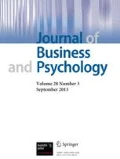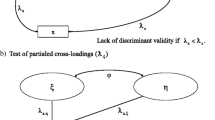Abstract
The present study solicited the reactions of 390 current and future job seekers to 13 selection procedures. Results suggest that applicants prefer selection methods with high apparent content validity, in particular, simulations (both written and oral) and tests with business-related content. Reference checks also received positive evaluations, while personality inventories, drug testing and honesty testing were generally viewed as neutral. Reactions to interviews varied according to interview content and nature of the interviewer (line versus staff). Overall, reactions were predictable on the basis of applicants' faith in the employer's ability to accurately interpret the procedure; their beliefs about the extent to which the employer actually needs to use the procedure, and their beliefs about likely self-performance on the procedure.
Similar content being viewed by others
References
Anastasi, A. (1988).Psychological testing (6th ed.). New York: MacMillan.
Arvey, R.D., Strickland, W., Drauden, G. & Martin, C. (1990). Motivational components of test taking.Personnel Psychology, 43, 695–716.
Barrick, M.R. & Mount, M.K. (1991). The big five personality dimensions and job performance: A meta-analysis.Personnel Psychology, 44, 1–26.
Bible, J.D. (1990). When employers look for things other than drugs: The legality of AIDS, genetic, intelligence, and honesty testing in the workplace.Labor Law Journal, 41, 195–213.
Boudreau, J.W. & Rynes, S.L. (1985). The role of recruitment in staffing utility analysis.Journal of Applied Psychology, 70, 354–366.
Carlson, E. (1990, November 6). Small companies move to increase anti-drug programs.Wall Street Journal, B-2.
Cascio, W.F. (1991).Applied psychology in personnel management (4th ed.). Englewood Cliffs, NJ: Prentice-Hall.
Cascio, W.F. & Phillips, N. (1979). Performance testing: A rose among thorns?Personnel Psychology, 32, 751–766.
Castro, J. (1986, March 17). Battling the enemy within.Time, 52–61.
Colberg, M. (1985). Logic-based measurement of verbal reasoning: A key to increased validity and economy.Personnel Psychology, 38, 347–360.
Connerley, M.L. & Rynes, S.L. (1992). In the eye of the beholder: The influence of organizational activities and recruiter characteristics on perceptions of recruiter effectiveness. Paper accepted for presentation at 1992 Academy of Management meetings, Las Vegas, NV, August 1992.
Crant, J.M. & Bateman, T.S. (1990). An experimental test of the impact of drug-testing programs on potential job applicants' attitudes and intentions.Journal of Applied Psychology, 75, 127–131.
Dreher, G.F., Ash, R.A. & Hancock, P. (1988). The role of traditional research design in underestimating the validity of the employment interview.Personnel Psychology, 41, 315–327.
Faley, R.H., Kleiman, L.S. & Wall, P.S. (1988). Drug testing in the public and private-sector workplaces: Technical and legal issues.Journal of Business and Psychology, 3, 154–186.
Gatewood, R.D. & Feild, H.S. (1990).Human resource selection. Chicago: Dryden Press.
Granovetter, M.S. (1974).Getting a job: A study of contacts and careers. Boston, MA: Harvard University Press.
Hakel, M.D. (1982). Employment interviewing. In K.M. Rowland & G.R. Ferris (Eds.),Personnel Management (pp. 129–155). Boston: Allyn & Bacon.
Hartigan, J.A. & Wigdor, A.K. (Eds.) (1989).Fairness in Employment Testing. Washington, D.C.: National Academy Press.
Herriot, P. (1989). Selection as a social process. In M. Smith & I.T. Robertson,Advances in selection and assessment (pp. 171–187). Chichester: John Wiley & Sons.
Hogan, J., Hogan, R. & Busch, C.M. (1984). How to measure service orientation.Journal of Applied Psychology, 69, 167–173.
Jones, J.W. & Wuebker, L.J. (1988). Accident prevention through personnel selection.Journal of Business and Psychology, 3, 187–198.
Keppel, G. (1973).Design and analysis: A researcher's handbook. Englewood Cliffs, NJ: Prentice-Hall.
Konovsky, M.A. & Cropanzano, R. (1991). Perceived Fairness of Employee Drug Testing as a Predictor of Employee Attitudes and Job Performance.Journal of Applied Psychology, 76, 698–708.
Latham, G.P. & Saari, L.M. (1984). Do people do what they say? Further studies on the situational interview.Journal of Applied Psychology, 69, 569–573.
Linn, R.L. (1982). Admissions testing on trial.American Psychologist, 37, 279–291.
Lyness, K. (1991). Discussant's presentation in R.R. Reilly (Chair),Perceived validity of selection procedures: Implications for organizations. Symposium conducted at the 6th annual meeting of the Society for Industrial and Organizational Psychology, April 26–28: St. Louis.
Martin, C.L. & Nagao, D.H. (1989). Some effects of computerized interviewing on job applicant responses.Journal of Applied Psychology, 74, 72–80.
Moore, T. (1987, March 30). Personality tests are back.Fortune, 74–78.
Murphy, K.R., Thornton, G.C. & Reynolds, D.H. (1990). College students' attitudes toward employee drug testing programs.Personnel Psychology, 43, 615–631.
Neter, E. & Ben-Shakhar, G. (1989). The predictive validity of graphological inferences: A meta-analytic approach.Personality and Individual Differences, 10, 737–745.
Ones, D.S., Viswesvaran, C. & Schmidt, P.L. (1991). Integrity test validities: Meta-analytic tests of moderator hypotheses. Paper presented at the 6th annual meeting of the Society for Industrial and Organizational Psychology, April 26–28: St. Louis.
Reilly, R.R., Stoffey, R.W. & Millsap, R. (1991). Influences of perceived validity and fairness of tests on perceptions of the organization. In R.R. Reilly (Chair),Perceived validity of selection procedures: Implications for organizations. Symposium conducted at the 6th annual meeting of the Society for Industrial and Organizational Psychology, April 26–28: St. Louis.
Ryan, A.M. & Sackett, P.R. (1987a). Pre-employment honesty testing: Fakability, reactions of test takers, and company image.Journal of Business and Psychology, 1, 248–256.
Ryan, A.M. & Sackett, P.R. (1987b). A survey of individual assessment practices by I/O psychologists.Personnel Psychology, 40, 455–489.
Rynes, S.L. (In press). Who's selecting whom? Effects of selection practices on applicant attitudes and behaviors. Forthcoming in W.C. Borman & N.W. Schmitt (eds.),Personnel Selection. San Francisco: Jossey-Bass, Inc.
Rynes, S.L. & Barber, A.E. (1990). Applicant attraction strategies: An organizational perspective.Academy of Management Review, 15, 286–310.
Rynes, S.L. & Boudreau, J.W. (1986). College recruiting in large organizations.Personnel Psychology, 39, 729–758.
Rynes, S.L., Bretz, R. D., Jr. & Gerhart, B. (1991). The importance of recruitment in job choice: A different way of looking. In press,Personnel Psychology, 44, 487–521.
Sackett, P.R., Burris, L.R. & Callahan, C. (1989). Integrity testing for personnel selection.Personnel Psychology, 42, 491–529.
Schmidt, F.L., Greenthal, A., Hunter, J.E., Berner, J. & Seaton, F. (1977). Job sample vs. paper-and-pencil trades and technical tests: Adverse impact and examinee attitudes.Personnel Psychology, 30, 187–197.
Schmidt, F.L. & Hunter, J.E. (1981). Employment testing: Old theories and new research findings.American Psychologist, 36, 1128–1137.
Schwab, D.P. (1982). Recuiting and organizational participation. In K. Rowland & G. Ferris (Eds.),Personnel management, 103–128. Boston: Allyn & Bacon.
Smither, J.W., Millsap, R.E., Stoffey, R.W. & Reilly, R.R. (1991). The influence of selection procedures on attitudes about the organization. In R.R. Reilly (Chair),Perceived validity of selection procedures: Implications for organizations. Symposium presented at 6th annual meeting of the Society for Industrial and Organizational Psychology, April 26–28: St. Louis.
Smither, J.W. & Pearlman, K. (1991). Perceptions of the job-relatedness of selection procedures among college recruits and recruiting/employment managers. Paper presented in R.R. Rely (Chair),Perceived validity of selection procedures: Implications for organizations. Symposium conducted at the 6th annual conference of the Society for Industrial and Organizational Psychology, April 26–28: St. Louis.
Sternberg, R.J. (1985).Beyond IQ: A triarchic theory of human intelligence. Cambridge: Cambridge University Press.
Stone, D.L. & Kotch, D.A. (1989). Individuals' attitudes toward organizational drug testing policies and practices.Journal of Applied Psychology, 74, 518–521.
Author information
Authors and Affiliations
Additional information
The authors wish to thank Murray Barrick, Barry Gerhart and Mick Mount for helpful comments on a previous version of this manuscript. We also thank Bob Bretz, Karin Ash, Pete Schoderbek, Duane Thompson, David Day, Denise Sorg and Marlys Moore for assistance in data collection.
Rights and permissions
About this article
Cite this article
Rynes, S.L., Connerley, M.L. Applicant reactions to alternative selection procedures. J Bus Psychol 7, 261–277 (1993). https://doi.org/10.1007/BF01015754
Issue Date:
DOI: https://doi.org/10.1007/BF01015754




